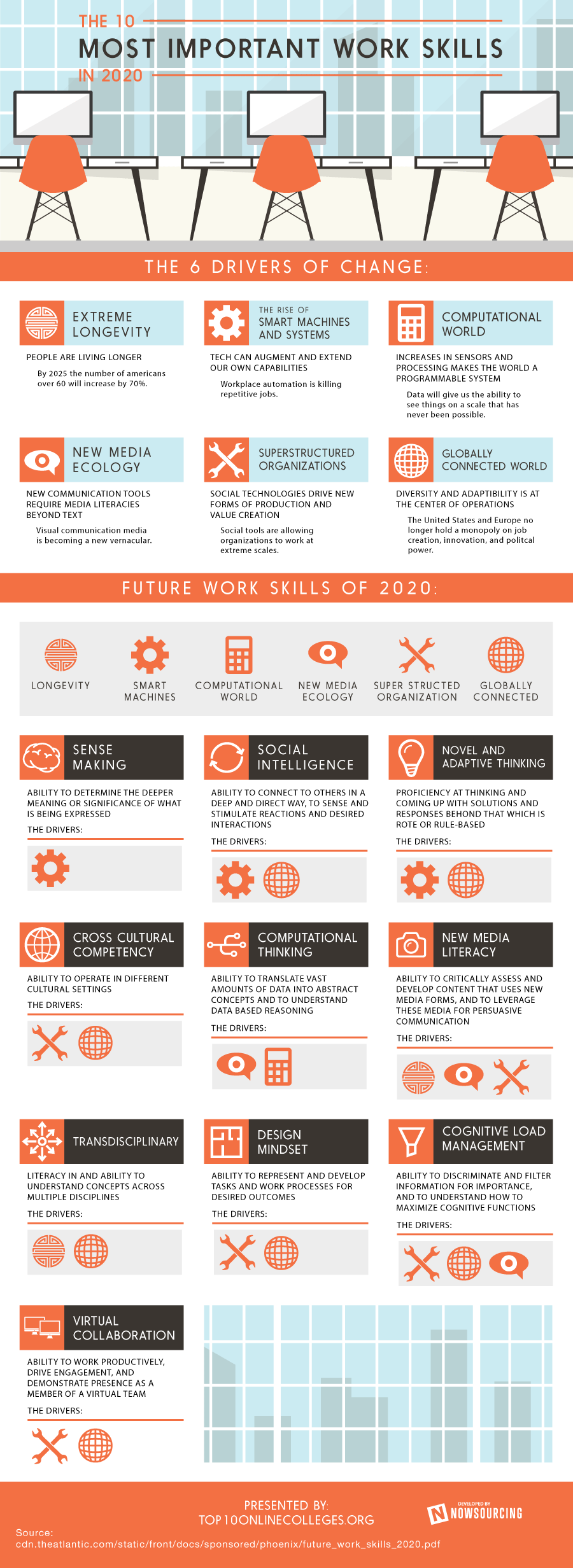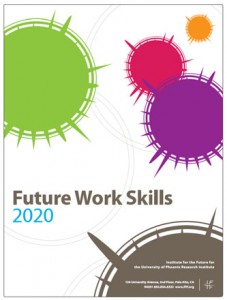Last week I was sent a link to an interesting infographic on the ten most important work skills in 2020. It is a graphic respresentation of research done by the University of Phoenix and the Institute for the Future (see their PDF report here). What I like about this is that the team that put it together has looked at the significant drivers of change in society and then worked out what work skills will be required to address these.
It’s a thought provoking read for parents, educators and businesses alike. Whilst none of the skills listed are really new, the emphasis is on their growing importance. The timeline is only 6 years away anyway, and so the focus was not on new skills but on what is becoming vital for success right now in our workplaces. You can find the infographic here, and a summary of their points below.
Source: Top10OnlineColleges.orgThe 6 Drivers of Change
○ All of the 10 skills will tie back into these disruptive shifts on the horizon:
■ Extreme Longevity
● People are living longer
○ By 2025 the number of Americans over 60 will increase by 70%■ The rise of smart machines and systems
● Tech can augment and extend our own capabilities
○ Workplace automation is killing repetitive jobs■ Computational world
● Increases in sensors and processing makes the world a programmable system
○ Data will give us the ability to see things on a scale that has never been possible■ New media ecology
● New communication tools require media literacy beyond text
○ Visual communication media is becoming a new vernacular■ Superstructed organizations
● Social technologies drive new forms of production and value creation
○ Social tools are allowing organizations to work at extreme scales■ Globally connected world
● Diversity and adaptability is at the center of operations
○ The United States and Europe no longer hold a monopoly on job creation, innovation, and political powerFuture Work Skills of 2020:
○ The Skill:
■ Sense making
● Ability to determine the deeper meaning or significance of what is being expressed
■ The Drivers: Rise of smart machines and systems
○ The Skill:
■ Social intelligence
● Ability to connect to others in a deep and direct way, to sense and stimulate reactions and desired interactions
■ The Drivers: Rise of smart machines and systems, Globally connected world
○ The Skill:
■ Novel and adaptive thinking
● Proficiency at thinking and coming up with solutions and responses beyond that which is rote or rule-based
■ The Drivers: Rise of smart machines and systems, Globally connected world
○ The Skill:
■ Cross cultural competency
● Ability to operate in different cultural settings
■ The Drivers: Superstructed organizations, Globally connected world
○ The Skill:
■ Computational thinking
● Ability to translate vast amounts of data into abstract concepts and to understand data based reasoning
■ The Drivers: New media ecology, Computational world
○ The Skill:
■ New Media Literacy
● Ability to critically assess and develop content that uses new media forms, and to leverage these media for persuasive communication
■ The Drivers: Extreme longevity, New media ecology, Superstructed organizations
○ The Skill:
■ Transdisciplinary
● Literacy in and ability to understand concepts across multiple disciplines
■ The Drivers: Extreme longevity, Computational world
○ The Skill:
■ Design Mindset
● Ability to represent and develop tasks and work processes for desired outcomes
■ The Drivers: Superstructed organizations, Computational world
○ The Skill:
■ Cognitive load management
● Ability to discriminate and filter information for importance, and to understand how to maximize cognitive functions
■ The Drivers: Superstructed organizations, Computational world, New media ecology
○ The Skill:
■ Virtual collaboration
● Ability to work productively, drive engagement, and demonstrate presence as a member of a virtual team
■ The Drivers: Superstructed organizations, Globally connected world



